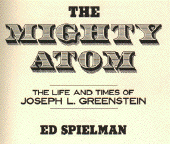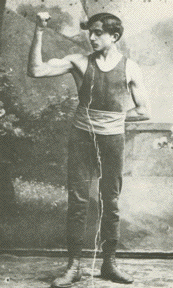The
Mighty Atom
The Life and Times of Joesph L.
Greenstein
The Life and Times of Joesph L. Greenstein
The Viking Press – New York 1979


I wish to thank the following people for their kind cooperation assistance: The Greenstein family, Cathy Bardram, Rancial I . Bassett, Victor Boff, Mrs. William L. Champion, George Dillnmii. Mollie Cohen Greenstein, John Grimek, Naraki Hara, Lew Horn. Jesse Kahn, Esq., Charles Kornhaber, R. E. Liebmann, Mario. Gel Socorro S. Martinez, Theron K. Rinehart, Irving Shapiro, AK Shenkman, Al Spielman, Sam Spielman, and Andrew Yelaney. Special thanks to: my brother, Howard Spielman; Lawrence “Slim the Hammer Man” Farman; my literary agent, Peter Lainpack; and friend and colleague of long standing, Howard D. Friedlander; Alan Williams of The Viking Press, for his insight and invaluable assistance.
PROLOGUE
In the days of the amusement palaces, when Coney Island was the playground of the world, the crowds stood twenty deep several times a day to watch the last of the great strongmen perform the impossible. My family were often among the spellbound. My grandparents ,Jacoh and Jennie Shapiro had made the transition from poverty on New York’s Lower East Side to Coney Island, an enclave of working-man’s luxury where hot and cold fresh and salt water was piped into the apartments. On Sundays Jacob, a gentle huar of a man, with his daughter Harriet on one hand and son Irving on the other, stood transfixed as the Mighty Atom performed his wonders. In earliest childhood I had been told by my family about this man; later, I believed him to be an exaggeration long lost in the dim past.


I first met the Mighty Atom at a martial arts show in Madison Square Garden. I was one of the featured guests, having created the Kung Fu television series which sparked the Kung Fu craze of the 1970s. I took my bow with David Carradine, some exploitation actors, and sundry exhibitionists before an audience of eighteen thousand devotees of the Bruce Lee cult. Various martial arts were demonstrated: man nearly cuts his buddy’s genitalia off with an m itation samurai sword. Applause. Two-hundred-twenty-pound man beats a 120-pound woman unconscious. More applause.
Then the old man appeared and walked up past the ring apron. His white hair flowed down to his shoulders; his brown leather tunic bore a gold Star of David. He looked like a living Maccabee. He was a short man, only 5 feet 4’2 inches, but broad; in his strongman’s costume he was a miniature Samson.
The crowd watched in silence as he bent horseshoes with his bare hands and bars of steel across the bridge of his nose, exploded chains with the expansion of his chest, and drove spikes through planks w metal-covered wood with nothing more than the power of his palm. Then the crowd came to its feet, and with good reason. This man was eighty-two years old. A half century after my grandfather had first seen him, I sat ringside, watching the strongman. I could hardly believe that Joseph “the Mighty Atom” Greenstein was still alive. As if deposited by a time machine, he stood in the center ring ot Madison Square Garden and seemed to transcend age anci time
It was not sheer animal strength that awed the crowd, but something greater, an inner power. One’s eyes were drawn to him; he was ancient, yet vitally alive, a compact boulder of granite that pounding water had washed and smoothed. Somehow, it was his mind that held you, not his body. This was no artifact of dumb muscle, but a man whose intelligence expressed itself in every line of his face.
I decided to visit him backstage, although I harbored no small suspicion. At thirty, I was successful by the standards I had set for myself: but broken promises (always accompanied by porcelain smiles and firm tan handshakes had made me cynical. When a Hollywood screenwriter has had his heart and cinematic vision vandalized a dozen times but is still resolute, he is called a professional. I found myself disaffected with an industry that twists wonderful screenplays into mediocre films. How significant to me was the opening scene of the film Sunset Boulevard, in which the screenwriter is found floating face down in the pool.
And so, in meeting the Mighty Atom, I maintained some reticence. afraid I would discover that he, too, was just another phony spellbinder, another product of show-biz hype. I could not face another disillusionment, confront the paling of another romantic image beside the reality.
I introduced myself. He was gracious, very soft-spoken, and his speech was flavored with the lyrical Yiddish accent of my grandparents. He invited me to his home. When we shook hands, he did so gingerly, as if afraid to crush mine. He had a good left eye; the right was blind and milky white. But that one good eye of crystal blue had the power of a Svengali. A life-force emanated from him, as if he had found the secret, the way to deny old age and death.
Some days later I went to see him. The neighborhood surrounding his brick row house on East Ninety-sixth Street and Rutland Road in Brooklyn was once the heart of a prosperous middle-class community. Now, glass was strewn in the streets and groups of stray dogs ran wild. Those of the old neighborhood had fled, all but one.
He came to the door; his shoulder-length hair was pinned under his skull cap, the powerful chest and wrestler’s arms concealed by a shirt and vest. He sported several lapel pins, one a memento presented by the Israel Defense Forces , another a prize for poetry.
He lived in an apartment at the rear of the multifamily house, with no woman to care for him. A wall plaque with the Hebrew word Shalom hung over a kitchen table cluttered with jars of pens, sheaves of Yiddish poems, and mail orders for Mighty Atom products from the one-man health company he had operated for fifty years. His vest matched neither his pants nor the jacket that was draped over the chair. He kept a pair of snow tires in the kitchen, an antique washboard and a fifty-year-old can opener were on the sink, Mighty Atom soap and liniment were in the bathroom.
He intended to sell the house and leave, We went down into the cellar to review the artifacts of a lifetime. Late at night, our only illumination coming from a bare bulb that hung over our heads, we were a pair of archeologists out to excavate his past glories. Rusted lengths of metal hung on an old display board, twisted into corkscrews as if by some uncontrollable force of nature, contorted into curliques like coiled auto springs. He could name the place and year for each object. He smiled when I found the key to the city of Saratoga Springs under a half inch of dust in a remote drawer; it was, he said, one of twenty such keys, and most of the others were destroyed in the great Coney Island fire. Bags of old fan mail sat by vaudeville posters and photos of the Atom in action,
The old man paused to reflect over a beaded bag that had been a favorite of his wife’s. Knowing full well that it would end up in the garbage when the next owner arrived, he put it in the “save” box, although he understood that he couldn’t take it when he moved to a room in his daughter’s house. A rare assortment of stuff: a .32 Smith and Wesson revolver that he had taken from a hooligan in the South of the 1930s, ancient Hebrew books, and others on Jewish history. We finished our treasure hunt after three hours.
The Atom and I talked late into the night. It was a dangerous neighborhood and over my protests he escorted me to my car. Despite my embarrassment I knew he was right: he was the Mighty Atom still.
I came to see him again and again, always with affectionate skepticism, waiting for self-aggrandizement, which never came, and never quite knowing where it would all lead. Days became years. I absorbed the myriad details of his life, though he often glossed over the most fantastic occurrences or feats with a mere nod or wave of his hand. “Is that true, Joe?” I would ask, and inevitably he would smile and, without seeking approbation, reveal printed documentation. He wished to relate his life to me because he knew that his years were growing short, and believed that if it were not all recorded somehow, it would be as if he had never lived it.
This is his story, as he told it to me, buttressed by decades of newspaper and magazine articles, personal interviews with eyewit-nesses, and my own observations and research. I have filled in a line of dialogue here and there, a missing conversation. Of his life, times, and feats I have invented nothing. The story is true.
Chapter 1
YOSSELLE
The heat was oppressive on July 15, 1893, the third day of the month of Tammuz in the Hebrew calendar. Chaya Greenstein, breathing heavily, carried water up Malorotczik Street in the poorest section of Suvalk, Poland, a garrison town near the German border. The woman, in the sixth month of her eighth pregnancy, stumbled and fell. Labor began almost immediately, and her baby was born soon after, a tiny, wizened thing weighing only three and a half pounds. Its eyes remained closed; only the faintest whisper of breath issued from its lips. She placed it in a small box, on a layer of cotton she had saturated with poppy-seed oil to protect the skin, and nursed it with an eye dropper.
In those days premature babies rarely survived, and when the child, which had been named Yosselle Leib (Joseph Lewis), endured for a week, news of the event spread. On the ninth day of Yosselle Greenstein’s life, his father Herschel, a rabbi who was obliged to eke out a living at unscholarly labor as a tanner, looked up from his book to see three well-dressed gentlemen trudging through the ankle-deep mud toward the house. They were three doctors, An-ievitch, Bokanofsky, and Nathanson, who had come to view the unusual infant. Herschel let them in and stood nearby as they gathered around the child. There was nothing they could do, they said. They inspected the biological curiosity for some time, and
in progress…………